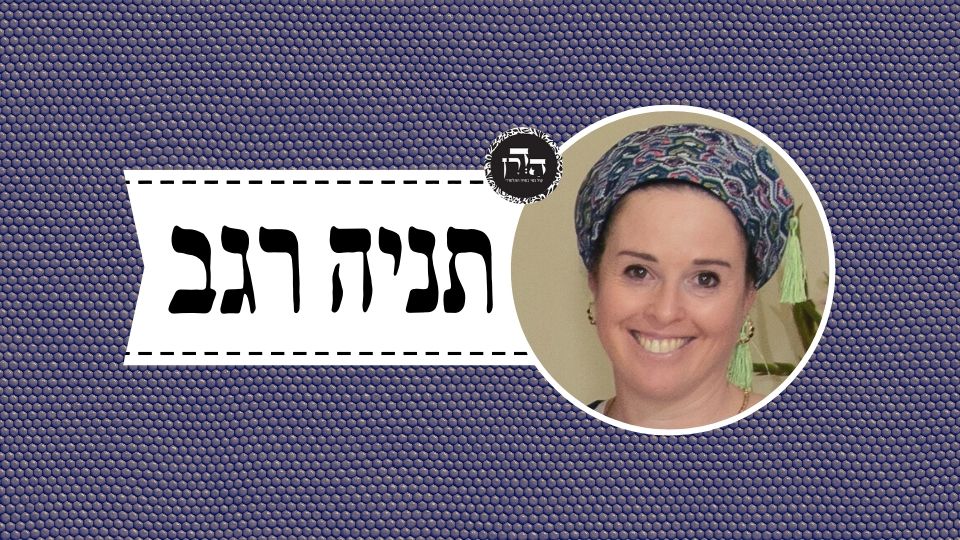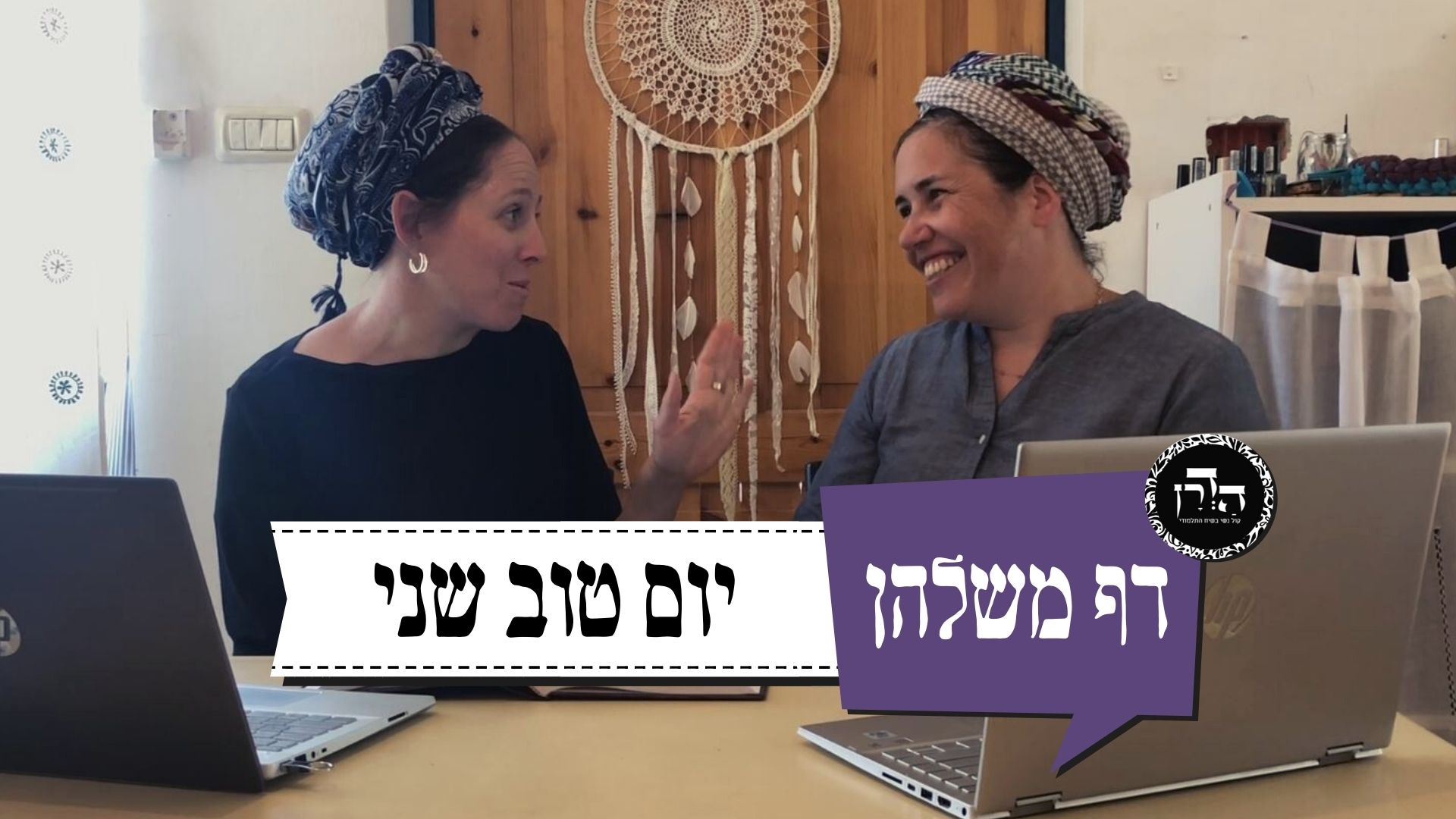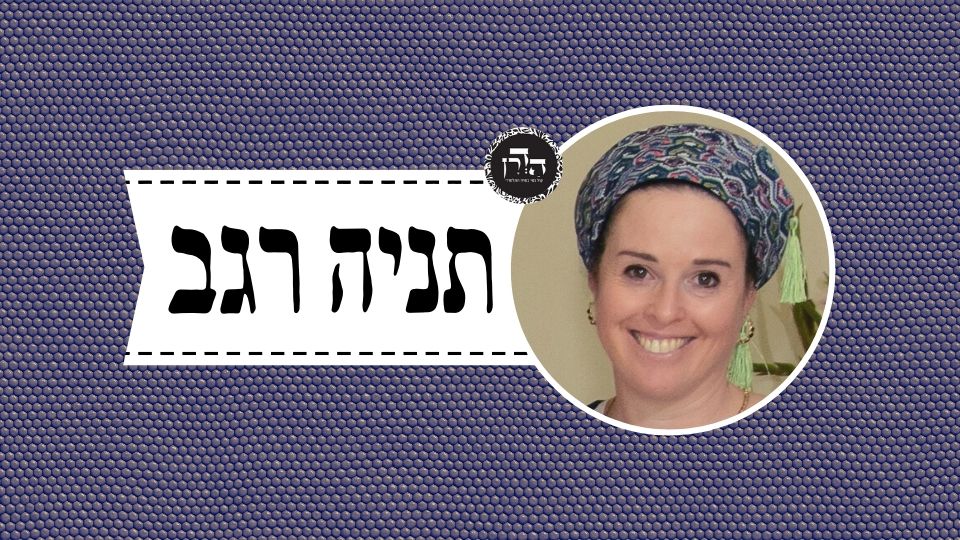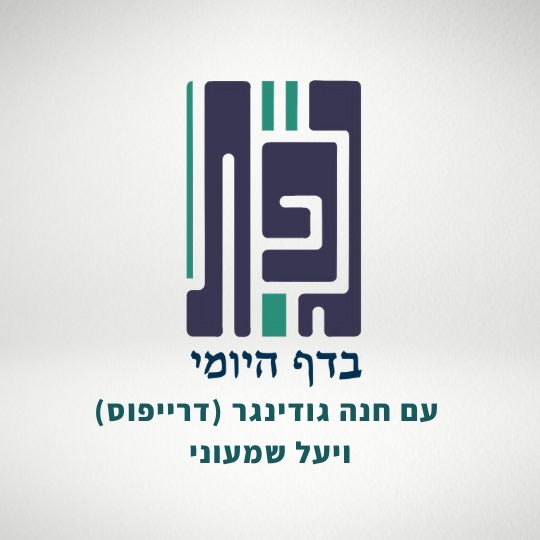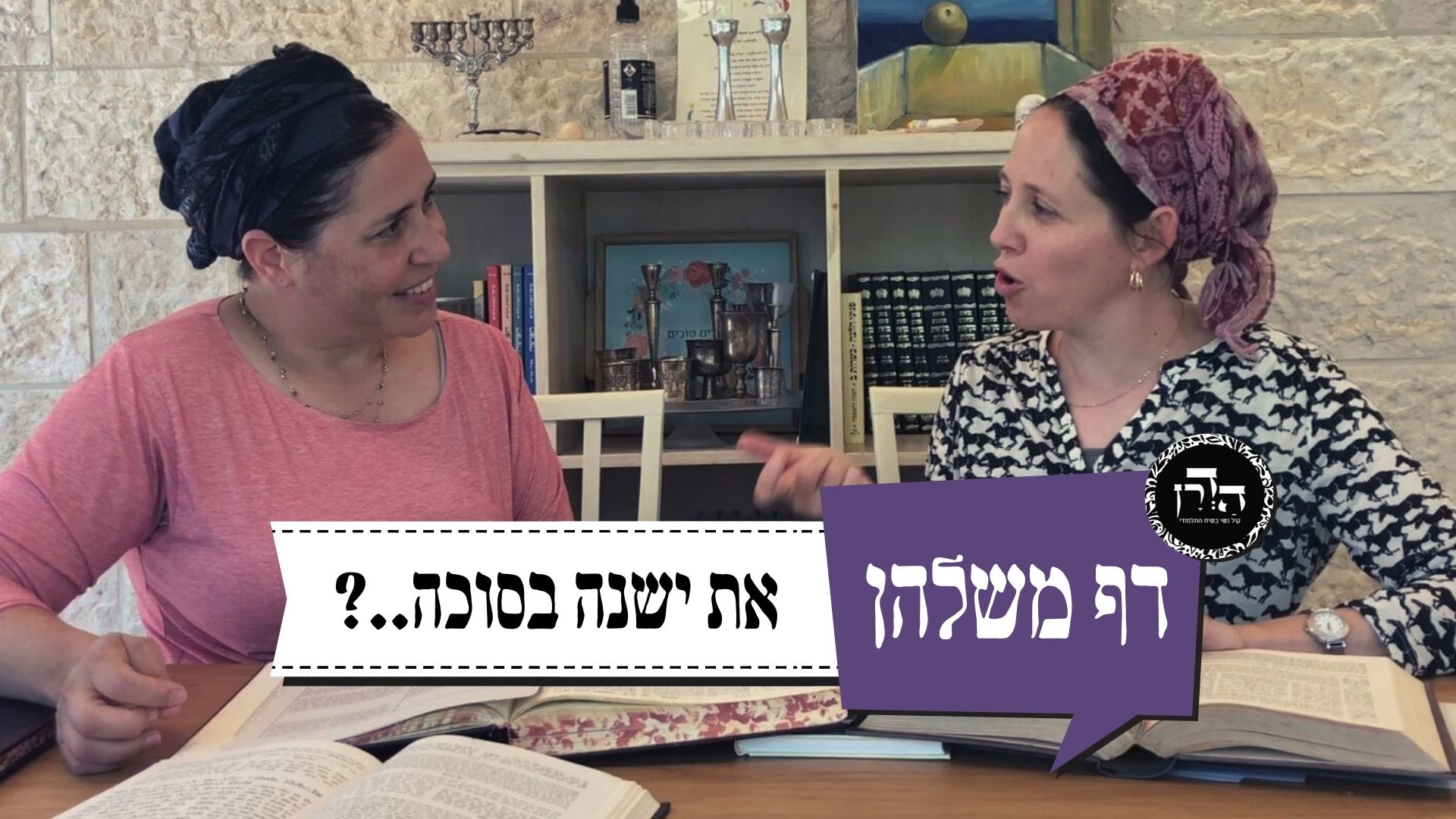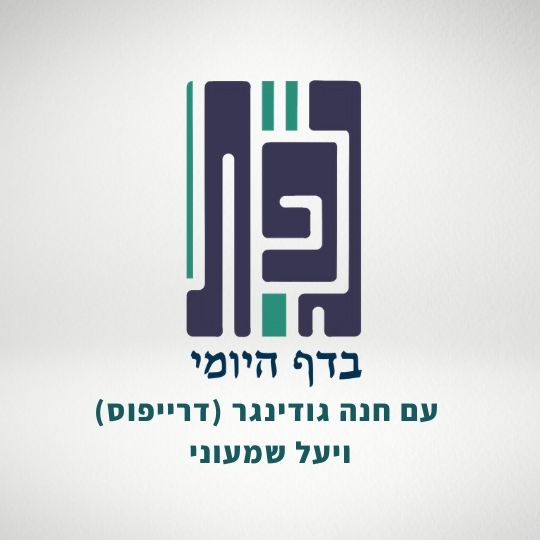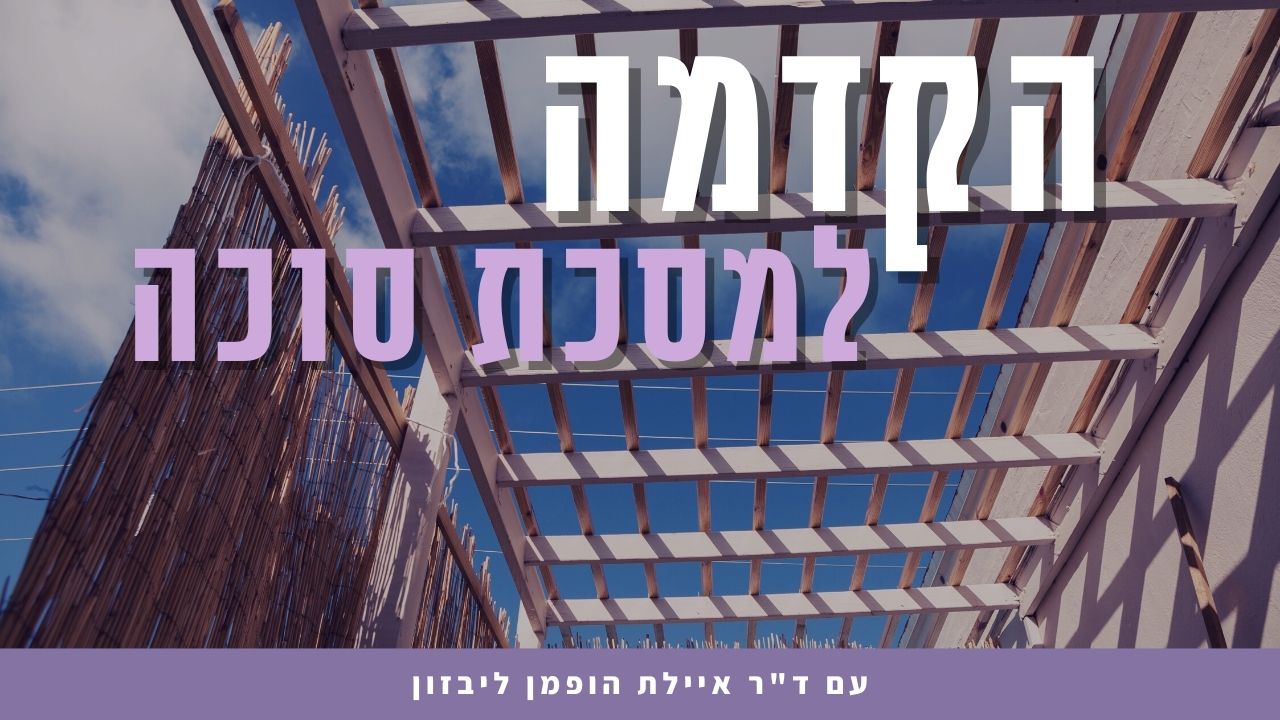סוכה נג
אִשָּׁה הָיְתָה בּוֹרֶרֶת חִטִּים לָאוֹר שֶׁל בֵּית הַשּׁוֹאֵבָה.
It was so bright that a woman would be able to sort wheat by the light of the Celebration of the Place of the Drawing of the Water.
חֲסִידִים וְאַנְשֵׁי מַעֲשֶׂה כּוּ׳. תָּנוּ רַבָּנַן, יֵשׁ מֵהֶן אוֹמְרִים: אַשְׁרֵי יַלְדוּתֵנוּ שֶׁלֹּא בִּיְּישָׁה אֶת זִקְנוּתֵנוּ — אֵלּוּ חֲסִידִים וְאַנְשֵׁי מַעֲשֶׂה. וְיֵשׁ מֵהֶן אוֹמְרִים: אַשְׁרֵי זִקְנוּתֵנוּ שֶׁכִּפְּרָה אֶת יַלְדוּתֵנוּ — אֵלּוּ בַּעֲלֵי תְשׁוּבָה. אֵלּוּ וָאֵלּוּ אוֹמְרִים: אַשְׁרֵי מִי שֶׁלֹּא חָטָא, וּמִי שֶׁחָטָא — יָשׁוּב וְיִמְחוֹל לוֹ.
§ The mishna continues: The pious and the men of action would dance before the people who attended the celebration. The Sages taught in the Tosefta that some of them would say in their song praising God: Happy is our youth, as we did not sin then, that did not embarrass our old age. These are the pious and the men of action, who spent all their lives engaged in Torah and mitzvot. And some would say: Happy is our old age, that atoned for our youth when we sinned. These are the penitents. Both these and those say: Happy is he who did not sin; and he who sinned should repent and God will absolve him.
תַּנְיָא: אָמְרוּ עָלָיו עַל הִלֵּל הַזָּקֵן, כְּשֶׁהָיָה שָׂמֵחַ בְּשִׂמְחַת בֵּית הַשּׁוֹאֵבָה, אָמַר כֵּן: אִם אֲנִי כָּאן — הַכֹּל כָּאן, וְאִם אֵינִי כָּאן — מִי כָּאן. הוּא הָיָה אוֹמֵר כֵּן: מָקוֹם שֶׁאֲנִי אוֹהֵב — שָׁם רַגְלַי מוֹלִיכוֹת אוֹתִי. אִם תָּבֹא אֶל בֵּיתִי — אֲנִי אָבֹא אֶל בֵּיתֶךָ, אִם אַתָּה לֹא תָּבֹא אֶל בֵּיתִי — אֲנִי לֹא אָבֹא אֶל בֵּיתֶךָ, שֶׁנֶּאֱמַר: ״בְּכׇל הַמָּקוֹם אֲשֶׁר אַזְכִּיר אֶת שְׁמִי אָבֹא אֵלֶיךָ וּבֵרַכְתִּיךָ״.
It is taught in the Tosefta: They said about Hillel the Elder that when he was rejoicing at the Celebration of the Place of the Drawing of the Water he said this: If I am here, everyone is here; and if I am not here, who is here? In other words, one must consider himself as the one upon whom it is incumbent to fulfill obligations, and he must not rely on others to do so. He would also say this: To the place that I love, there my feet take me, and therefore, I come to the Temple. And the Holy One, Blessed be He, says: If you come to My house, I will come to your house; if you do not come to My house, I will not come to your house, as it is stated: “In every place that I cause My name to be mentioned, I will come to you and bless you” (Exodus 20:21).
אַף הוּא רָאָה גֻּלְגּוֹלֶת אַחַת שֶׁצָּפָה עַל פְּנֵי הַמַּיִם, אֲמַר לַהּ: עַל דְּאַטֵּפְתְּ אַטְפוּךְ וּמְטִיפַיִךְ יְטוּפוּן. אָמַר רַבִּי יוֹחָנָן: רַגְלוֹהִי דְּבַר אִינִישׁ אִינּוּן עָרְבִין בֵּיהּ, לַאֲתַר דְּמִיתְבְּעֵי — תַּמָּן מוֹבִילִין יָתֵיהּ.
The Gemara cites another statement of Hillel the Elder. Additionally, he saw one skull that was floating on the water and he said to it: Because you drowned others, they drowned you, and those that drowned you will be drowned. That is the way of the world; everyone is punished measure for measure. Apropos following one’s feet, Rabbi Yoḥanan said: The feet of a person are responsible for him; to the place where he is in demand, there they lead him.
הָנְהוּ תַּרְתֵּי כּוּשָׁאֵי דַּהֲווֹ קָיְימִי קַמֵּי שְׁלֹמֹה, אֱלִיחֹרֶף וַאֲחִיָּה בְּנֵי שִׁישָׁא, סוֹפְרִים דִּשְׁלֹמֹה הֲווֹ. יוֹמָא חַד חַזְיֵיהּ מַלְאַךְ הַמָּוֶת דַּהֲוָה קָא עֲצִיב, אֲמַר לֵיהּ: אַמַּאי עֲצִיבַתְּ? אֲמַר לֵיהּ: דְּקָא בָעוּ מִינַּאי הָנֵי תַּרְתֵּי כּוּשָׁאֵי דְּיָתְבִי הָכָא. מַסְרִינְהוּ לִשְׂעִירִים, שַׁדְּרִינְהוּ לְמָחוֹזָא דְלוּז. כִּי מְטוֹ לְמָחוֹזָא דְלוּז — שְׁכִיבוּ.
The Gemara relates with regard to these two Cushites who would stand before Solomon: “Elihoreph and Ahijah, the sons of Shisha” (I Kings 4:3), and they were scribes of Solomon. One day Solomon saw that the Angel of Death was sad. He said to him: Why are you sad? He said to him: They are asking me to take the lives of these two Cushites who are sitting here. Solomon handed them to the demons in his service, and sent them to the district of Luz, where the Angel of Death has no dominion. When they arrived at the district of Luz, they died.
לִמְחַר, חַזְיֵהּ מַלְאַךְ הַמָּוֶת דַּהֲוָה קָבָדַח! אֲמַר לֵיהּ: אַמַּאי בְּדִיחַתְּ? אֲמַר לֵיהּ: בַּאֲתַר דִּבְעוֹ מִינַּאי, תַּמָּן שַׁדַּרְתִּינְהוּ. מִיָּד פָּתַח שְׁלֹמֹה וְאָמַר: רַגְלוֹהִי דְּבַר אִינִישׁ אִינּוּן עָרְבִין בֵּיהּ, לַאֲתַר דְּמִיתְבְּעֵי — תַּמָּן מוֹבִילִין יָתֵיהּ.
The following day, Solomon saw that the Angel of Death was happy. He said to him: Why are you happy? He replied: In the place that they asked me to take them, there you sent them. The Angel of Death was instructed to take their lives in the district of Luz. Since they resided in Solomon’s palace and never went to Luz, he was unable to complete his mission. That saddened him. Ultimately, Solomon dispatched them to Luz, enabling the angel to accomplish his mission. That pleased him. Immediately, Solomon began to speak and said: The feet of a person are responsible for him; to the place where he is in demand, there they lead him.
תַּנְיָא: אָמְרוּ עָלָיו עַל רַבָּן שִׁמְעוֹן בֶּן גַּמְלִיאֵל, כְּשֶׁהָיָה שָׂמֵחַ שִׂמְחַת בֵּית הַשּׁוֹאֵבָה, הָיָה נוֹטֵל שְׁמֹנֶה אֲבוּקוֹת שֶׁל אוֹר, וְזוֹרֵק אַחַת וְנוֹטֵל אַחַת וְאֵין נוֹגְעוֹת זוֹ בָּזוֹ. וּכְשֶׁהוּא מִשְׁתַּחֲוֶה, נוֹעֵץ שְׁנֵי גּוּדָלָיו בָּאָרֶץ וְשׁוֹחֶה וְנוֹשֵׁק אֶת הָרִצְפָּה וְזוֹקֵף, וְאֵין כׇּל בְּרִיָּה יְכוֹלָה לַעֲשׂוֹת כֵּן, וְזוֹ הִיא קִידָּה.
§ It is taught in a baraita: They said about Rabban Shimon ben Gamliel that when he would rejoice at the Celebration of the Place of the Drawing of the Water, he would take eight flaming torches and toss one and catch another, juggling them, and, though all were in the air at the same time, they would not touch each other. And when he would prostrate himself, he would insert his two thumbs into the ground, and bow, and kiss the floor of the courtyard and straighten, and there was not any other creature that could do that due to the extreme difficulty involved. And this was the form of bowing called kidda performed by the High Priest.
לֵוִי אַחְוִי קִידָּה קַמֵּיהּ דְּרַבִּי וְאִיטְּלַע. וְהָא גְּרַמָא לֵיהּ? וְהָאָמַר רַבִּי אֶלְעָזָר: לְעוֹלָם אַל יָטִיחַ אָדָם דְּבָרִים כְּלַפֵּי מַעְלָה, שֶׁהֲרֵי אָדָם גָּדוֹל הֵטִיחַ דְּבָרִים כְּלַפֵּי מַעְלָה וְאִיטְּלַע, וּמַנּוּ — לֵוִי. הָא וְהָא גְּרַמָא לֵיהּ.
The Gemara relates: Levi demonstrated a kidda before Rabbi Yehuda HaNasi and strained his thigh and came up lame. The Gemara asks: And is that what caused him to be lame? But didn’t Rabbi Elazar say: One should never speak impertinently toward God above; as a great person once spoke impertinently toward God above, and even though his prayers were answered, he was still punished and came up lame. And who was this great person? It was Levi. Apparently his condition was not caused by his bow. The Gemara answers: There is no contradiction. Both this and that caused him to come up lame; because he spoke impertinently toward God, he therefore was injured when exerting himself in demonstrating kidda.
לֵוִי הֲוָה מְטַיֵּיל קַמֵּיהּ דְּרַבִּי בְּתַמְנֵי סַכִּינֵי. שְׁמוּאֵל קַמֵּיהּ שַׁבּוּר מַלְכָּא בִּתְמָנְיָא מְזָגֵי חַמְרָא. אַבָּיֵי קַמֵּיהּ (דְּרָבָא) בִּתְמָנְיָא בֵּיעֵי, וְאָמְרִי לַהּ בְּאַרְבְּעָה בֵּיעֵי.
Apropos the rejoicing of Rabban Shimon ben Gamliel at the Celebration of the Place of the Drawing of the Water, the Gemara recounts: Levi would walk before Rabbi Yehuda HaNasi juggling with eight knives. Shmuel would juggle before King Shapur with eight glasses of wine without spilling. Abaye would juggle before Rabba with eight eggs. Some say he did so with four eggs. All these were cited.
תַּנְיָא, אָמַר רַבִּי יְהוֹשֻׁעַ בֶּן חֲנַנְיָה: כְּשֶׁהָיִינוּ שְׂמֵחִים שִׂמְחַת בֵּית הַשּׁוֹאֵבָה, לֹא רָאִינוּ שֵׁינָה בְּעֵינֵינוּ. כֵּיצַד? שָׁעָה רִאשׁוֹנָה תָּמִיד שֶׁל שַׁחַר, מִשָּׁם לִתְפִלָּה, מִשָּׁם לְקׇרְבַּן מוּסַף, מִשָּׁם לִתְפִלַּת הַמּוּסָפִין, מִשָּׁם לְבֵית הַמִּדְרָשׁ, מִשָּׁם לַאֲכִילָה וּשְׁתִיָּה, מִשָּׁם לִתְפִלַּת הַמִּנְחָה, מִשָּׁם לְתָמִיד שֶׁל בֵּין הָעַרְבַּיִם, מִכָּאן וְאֵילָךְ לְשִׂמְחַת בֵּית הַשּׁוֹאֵבָה.
It is taught in a baraita that Rabbi Yehoshua ben Ḥananya said: When we would rejoice in the Celebration of the Place of the Drawing of the Water, we did not see sleep in our eyes the entire Festival. How so? In the first hour of the day, the daily morning offering was sacrificed and everyone came to watch. From there they proceeded to engage in prayer in the synagogue; from there, to watch the sacrifice of the additional offerings; from there, to the synagogue to recite the additional prayer. From there they would proceed to the study hall to study Torah; from there to the eating and drinking in the sukka; from there to the afternoon prayer. From there they would proceed to the daily afternoon offering in the Temple. From this point forward, they proceeded to the Celebration of the Place of the Drawing of the Water.
אִינִי? וְהָאָמַר רַבִּי יוֹחָנָן: ״שְׁבוּעָה שֶׁלֹּא אִישַׁן שְׁלֹשָׁה יָמִים״ — מַלְקִין אוֹתוֹ וְיָשֵׁן לְאַלְתַּר! אֶלָּא הָכִי קָאָמַר: לֹא טָעַמְנוּ טַעַם שֵׁינָה, דַּהֲווֹ מְנַמְנְמִי אַכַּתְפָּא דַהֲדָדֵי.
The Gemara wonders: Is that so? But didn’t Rabbi Yoḥanan say: One who took an oath that I will not sleep three days, one flogs him immediately for taking an oath in vain, and he may sleep immediately because it is impossible to stay awake for three days uninterrupted. Rather, this is what Rabbi Yehoshua is saying: We did not experience the sense of actual sleep, because they would merely doze on each other’s shoulders. In any case, they were not actually awake for the entire week.
חֲמֵשׁ עֶשְׂרֵה מַעֲלוֹת. אֲמַר לֵיהּ רַב חִסְדָּא לְהָהוּא מִדְּרַבָּנַן דַּהֲוָה קָמְסַדַּר אַגָּדָתָא קַמֵּיהּ, אֲמַר לֵיהּ: שְׁמִיעַ לְךָ, הָנֵי חֲמֵשׁ עֶשְׂרֵה מַעֲלוֹת, כְּנֶגֶד מִי אֲמָרָם דָּוִד? אֲמַר לֵיהּ: הָכִי אָמַר רַבִּי יוֹחָנָן: בְּשָׁעָה שֶׁכָּרָה דָּוִד שִׁיתִין, קְפָא תְּהוֹמָא וּבָעֵי לְמִשְׁטְפֵיהּ לְעָלְמָא. אָמַר דָּוִד חֲמֵשׁ עֶשְׂרֵה מַעֲלוֹת וְהוֹרִידָן. אִי הָכִי, חֲמֵשׁ עֶשְׂרֵה ״מַעֲלוֹת״ — ״יוֹרְדוֹת״ מִיבְּעֵי לֵיהּ!
§ The mishna continues: The musicians would stand on the fifteen stairs that descend from the Israelites’ courtyard to the Women’s Courtyard, corresponding to the fifteen Songs of the Ascents in Psalms. Rav Ḥisda said to one of the Sages who was organizing aggada before him: Did you hear with regard to these fifteen Songs of Ascents in Psalms, corresponding to what did David say them? He said to him that this is what Rabbi Yoḥanan said: At the time that David dug the drainpipes in the foundation of the Temple, the waters of the depths rose and sought to inundate the world. Immediately, David recited the fifteen Songs of the Ascents and caused them to subside. Rav Ḥisda asked: If so, should they be called fifteen Songs of the Ascents? They should have been called Songs of the Descents.
אֲמַר לֵיהּ: הוֹאִיל וְאַדְכַּרְתַּן (מִלְּתָא), הָכִי אִתְּמַר: בְּשָׁעָה שֶׁכָּרָה דָּוִד שִׁיתִין, קְפָא תְּהוֹמָא וּבְעָא לְמִשְׁטְפֵיהּ לְעָלְמָא. אָמַר דָּוִד: מִי אִיכָּא דְּיָדַע אִי שְׁרֵי לְמִכְתַּב שֵׁם
Rav Ḥisda continued and said to him: Since you reminded me of this matter, this is what was originally stated: At the time that David dug the drainpipes, the waters of the depths rose and sought to inundate the world. David said: Is there anyone who knows whether it is permitted to write the sacred name
אַחַסְפָּא, וְנִשְׁדְּיֵהּ בִּתְהוֹמָא וּמַנַּח! לֵיכָּא דְּקָאָמַר לֵיהּ מִידֵּי. אֲמַר דָּוִד: כׇּל דְּיָדַע לְמֵימַר וְאֵינוֹ אוֹמֵר, יֵחָנֵק בִּגְרוֹנוֹ. נָשָׂא אֲחִיתוֹפֶל קַל וָחוֹמֶר בְּעַצְמוֹ: וּמָה לַעֲשׂוֹת שָׁלוֹם בֵּין אִישׁ לְאִשְׁתּוֹ, אָמְרָה תּוֹרָה: שְׁמִי שֶׁנִּכְתַּב בִּקְדוּשָּׁה יִמָּחֶה עַל הַמַּיִם, לַעֲשׂוֹת שָׁלוֹם לְכׇל הָעוֹלָם כּוּלּוֹ — עַל אַחַת כַּמָּה וְכַמָּה. אֲמַר לֵיהּ: שְׁרֵי.
on an earthenware shard? If it is permitted, we will write it and throw it into the depths, and they will subside. There was no one who said anything to him. David said: Anyone who knows what to say and does not say anything may he be strangled in his throat. Then Ahithophel raised an a fortiori argument on his own and said: And just as in order to make peace between a man and his wife in the case of sota, when the husband suspects his wife of having committed adultery, the Torah said: My Name that was written in sanctity will be erased on the water to establish peace for the whole world in its entirety, all the more so it is permitted. He said to David: It is permitted.
כָּתֵב שֵׁם אַחַסְפָּא וְשָׁדֵי לִתְהוֹמָא, וּנְחֵית תְּהוֹמָא שִׁיתְּסַר אַלְפֵי גַּרְמִידֵי. כִּי חָזֵי דְּנָחֵית טוּבָא, אֲמַר: כַּמָּה דְּמִידְּלֵי — טְפֵי מִירְטַב עָלְמָא. אֲמַר חֲמֵשׁ עֶשְׂרֵה מַעֲלוֹת, וְאַסְּקֵיהּ חֲמֵיסַר אַלְפֵי גַּרְמִידֵי, וְאוֹקְמֵיהּ בְּאַלְפָּא גַּרְמִידֵי. אָמַר עוּלָּא: שְׁמַע מִינַּהּ סוּמְכָא דְאַרְעָא אַלְפָּא גַּרְמִידֵי. וְהָא חָזֵינַן דְּכָרֵינַן פּוּרְתָּא וְנָפְקִי מַיָּא! אָמַר רַב מְשַׁרְשְׁיָא: הָהוּא מִסּוּלָּמָא דִפְרָת.
He wrote the sacred name on an earthenware shard and cast it into the depths, and the waters in the depths subsided sixteen thousand cubits. When he saw that they subsided excessively, he said: The higher the waters in the aquifers, the moister and more fertile the soil of the world. He recited the fifteen Songs of the Ascents and elevated them fifteen thousand cubits, and established them at a depth of one thousand cubits. Ulla said: Learn from here that the thickness of the earth above the waters of the depths is one thousand cubits. The Gemara asks: But don’t we see that when we dig a little, significantly less than one thousand cubits, water emerges? Rav Mesharshiyya said: That is from the ascent of the Euphrates River, which flows at a higher altitude than do other rivers. The water flows up through underground passages to reach the river. That is why water emerges when one digs in the hills of Babylonia.
וְעָמְדוּ כֹּהֲנִים בְּשַׁעַר הָעֶלְיוֹן שֶׁיּוֹרֵד כּוּ׳. בָּעֵי רַבִּי יִרְמְיָה: לְמַעֲלָה עֲשִׂירִית — דְּנָחֵית חַמְשָׁה וְקָאֵי אַעַשְׂרָה, אוֹ דִלְמָא דְּנָחֵית עַשְׂרָה וְקָאֵי אַחַמְשָׁה? תֵּיקוּ.
§ The mishna continues: And two priests stood with two trumpets at the Upper Gate that descends from the Israelites’ courtyard to the Women’s Courtyard, and when those drawing the water reached the tenth stair they sounded the trumpets. Rabbi Yirmeya raised a dilemma: Does the phrase reached the tenth stair mean that he would descend five stairs and stand on the tenth from the bottom? Or perhaps it means that he would descend ten stairs and stand on the fifth from the bottom? The Gemara notes: The dilemma shall stand unresolved.
תָּנוּ רַבָּנַן, מִמַּשְׁמַע שֶׁנֶּאֱמַר: ״וּפְנֵיהֶם קֵדְמָה״, אֵינִי יוֹדֵעַ שֶׁ״אֲחוֹרֵיהֶם אֶל הֵיכַל ה׳״?
The mishna describes: When they reached the gate through which one exits to the east, they turned from facing east to facing west toward the Holy of Holies, and said: Our ancestors who were in this place during the First Temple period did not conduct themselves appropriately and stood “with their backs toward the Sanctuary of the Lord, and their faces toward the east; and they worshipped the sun toward the east” (Ezekiel 8:16), and we, our eyes are to God. The Sages taught: By inference, from the fact that it is stated: “And their faces toward the east,” don’t I know that “their backs were toward the Sanctuary of the Lord”? The Sanctuary was to the west.
אֶלָּא מָה תַּלְמוּד לוֹמַר: ״אֲחוֹרֵיהֶם אֶל הֵיכַל ה׳״ — מְלַמֵּד שֶׁהָיוּ פּוֹרְעִין עַצְמָן, וּמַתְרִיזִין כְּלַפֵּי מַטָּה.
Rather, to what purpose does the verse state: “Their backs toward the Sanctuary of the Lord”? It is an allusion to the fact that in addition to turning their backs on the Sanctuary of the Lord, they performed an additional evil. It teaches that they would expose themselves and defecate downward, a euphemism for the direction of the Divine Presence.
אָנוּ לְיָהּ וּלְיָהּ עֵינֵינוּ כּוּ׳. אִינִי?! וְהָאָמַר רַבִּי זֵירָא: כׇּל הָאוֹמֵר ״שְׁמַע״ ״שְׁמַע״, כְּאִילּוּ אָמַר ״מוֹדִים״ ״מוֹדִים״! אֶלָּא הָכִי אָמְרִי: הֵמָּה מִשְׁתַּחֲוִים קֵדְמָה, וְאָנוּ לְיָהּ (אֲנַחְנוּ מוֹדִים), וְעֵינֵינוּ לְיָהּ מְיַחֲלוֹת.
The mishna continues: In the Second Temple period they would say: We are to God, and to God are our eyes. The Gemara asks: Is that so? May one pray in that manner? Didn’t Rabbi Zeira say: One who repeats himself while reciting Shema and says: Listen, listen, is like one who says: We give thanks, we give thanks, and he is silenced, as it appears that he is worshipping two authorities. How then did they recite God’s name twice, consecutively? Rather, this is what they said: They bow toward the east, while we give thanks to God, and our eyes turn in hope to God, so that they would not recite God’s name consecutively.
מַתְנִי׳ אֵין פּוֹחֲתִין מֵעֶשְׂרִים וְאַחַת תְּקִיעוֹת בַּמִּקְדָּשׁ, וְאֵין מוֹסִיפִין עַל אַרְבָּעִים וּשְׁמֹנֶה. בְּכׇל יוֹם הָיוּ שָׁם עֶשְׂרִים וְאַחַת תְּקִיעוֹת בַּמִּקְדָּשׁ: שָׁלֹשׁ לִפְתִיחַת שְׁעָרִים, וְתֵשַׁע לְתָמִיד שֶׁל שַׁחַר, וְתֵשַׁע לְתָמִיד שֶׁל בֵּין הָעַרְבַּיִם. וּבַמּוּסָפִין הָיוּ מוֹסִיפִין עוֹד תֵּשַׁע.
MISHNA: One sounds no fewer than twenty-one trumpet blasts in the Temple, and one sounds no more than forty-eight. The mishna elaborates: Each day there were twenty-one trumpet blasts in the Temple: Three blasts were sounded for the opening of the gates in the morning, nine for the daily morning offering, and nine for the daily afternoon offering, totaling twenty-one. And on a day when the additional offerings were sacrificed, e.g., the New Moon, with the additional offerings they would add nine additional blasts.
וּבְעֶרֶב שַׁבָּת הָיוּ מוֹסִיפִין שֵׁשׁ: שָׁלֹשׁ לְהַבְטִיל אֶת הָעָם מִמְּלָאכָה, וְשָׁלֹשׁ לְהַבְדִּיל בֵּין קֹדֶשׁ לְחוֹל.
And on Shabbat eve they would add six blasts sounded adjacent to the onset of Shabbat: Three to stop the people from their labor, as the blasts inform the people that Shabbat is approaching and they stop working, and three at the onset of Shabbat to demarcate between sacred and profane.
עֶרֶב שַׁבָּת שֶׁבְּתוֹךְ הַחַג הָיוּ שָׁם אַרְבָּעִים וּשְׁמֹנֶה: שָׁלֹשׁ לִפְתִיחַת שְׁעָרִים, שָׁלֹשׁ לְשַׁעַר הָעֶלְיוֹן, וְשָׁלֹשׁ לְשַׁעַר הַתַּחְתּוֹן, וְשָׁלֹשׁ לְמִילּוּי הַמַּיִם, וְשָׁלֹשׁ עַל גַּבֵּי מִזְבֵּחַ, תֵּשַׁע לְתָמִיד שֶׁל שַׁחַר, וְתֵשַׁע לְתָמִיד שֶׁל בֵּין הָעַרְבַּיִם, וְתֵשַׁע לְמוּסָפִין, שָׁלֹשׁ לְהַבְטִיל אֶת הָעָם מִן הַמְּלָאכָה, וְשָׁלֹשׁ לְהַבְדִּיל בֵּין קוֹדֶשׁ לְחוֹל.
On Shabbat eve during the festival of Sukkot, there were forty-eight blasts. How so? Three in the morning for the opening of the gates; three for the upper gate; and three for the lower gate; and three for the filling of the vessel with water, as described in the sequence of the ritual of drawing the water for the water libation (48b); and three when pouring the water libation upon the altar; nine for the daily morning offering; and nine for the daily afternoon offering; and nine for the additional offerings; three to stop the people from work; and three more to demarcate between sacred and profane, totaling forty-eight blasts.
גְּמָ׳ מַתְנִיתִין דְּלָא כְּרַבִּי יְהוּדָה. דְּתַנְיָא, רַבִּי יְהוּדָה אוֹמֵר: הַפּוֹחֵת לֹא יִפְחוֹת מִשֶּׁבַע, וְהַמּוֹסִיף לֹא יוֹסִיף עַל שֵׁשׁ עֶשְׂרֵה. בְּמַאי קָא מִיפַּלְגִי? רַבִּי יְהוּדָה סָבַר: תְּקִיעָה תְּרוּעָה תְּקִיעָה — אַחַת הִיא, וְרַבָּנַן סָבְרִי: תְּקִיעָה לְחוּד וּתְרוּעָה לְחוּד.
GEMARA: The Gemara notes: The mishna is not in accordance with the opinion of Rabbi Yehuda, as it is taught in a baraita that Rabbi Yehuda says: The one who seeks to minimize the number of blasts shall not minimize their number to fewer than seven blasts. And one who seeks to add to the number of blasts shall not add beyond sixteen. The Gemara asks: With regard to what do they disagree? The Gemara explains that Rabbi Yehuda holds: A series of blasts consisting of tekia, terua, tekia is counted as one blast. And the Rabbis hold: A tekia is counted separately and a terua is counted separately. They agree with regard to the sequence and the number of the blasts, and disagree only with regard to how the blasts are tallied.
מַאי טַעְמָא דְּרַבִּי יְהוּדָה? אָמַר קְרָא: ״וּתְקַעְתֶּם תְּרוּעָה״ (וּכְתִיב: ״תְּרוּעָה יִתְקְעוּ״, הָא כֵּיצַד? תְּקִיעָה וּתְרוּעָה — אַחַת הִיא). וְרַבָּנַן: הַהוּא לִפְשׁוּטָה לְפָנֶיהָ וּלְאַחֲרֶיהָ הוּא דַּאֲתָא (וְרַבִּי יְהוּדָה, לְפָנֶיהָ וּלְאַחֲרֶיהָ מְנָלֵיהּ? נָפְקָא לֵיהּ מִ״שֵּׁנִית״).
The Gemara asks: What is the rationale for the opinion of Rabbi Yehuda? It is as the verse states: “And you shall sound [utkatem] a terua” (Numbers 10:5), and it is written: “A terua they will sound [yitke’u]” (Numbers 10:6). How is it that the Torah uses a verb from the root of tekia to describe the sounding of a terua? Apparently, a tekia and a terua together compose one blast. And how do the Rabbis interpret these verses? This comes to teach that each terua blast is accompanied by a plain unembellished blast, a tekia, preceding it and following it. The Gemara asks: And from where does Rabbi Yehuda derive that each terua must be accompanied by a tekia preceding it and following it? The Gemara explains: He derives it from the verse when it says: “And you shall sound [utkatem] a terua a second time” (Numbers 10:6), indicating an additional tekia.
וְרַבָּנַן, מַאי טַעְמַיְיהוּ? דִּכְתִיב: ״וּבְהַקְהִיל אֶת הַקָּהָל תִּתְקְעוּ וְלֹא תָרִיעוּ״, וְאִי סָלְקָא דַעְתָּךְ: תְּקִיעָה תְּרוּעָה — אַחַת הִיא, אָמַר רַחֲמָנָא פַּלְגָא דְּמִצְוָה עֲבֵיד וּפַלְגָא לָא עֲבֵיד?! וְרַבִּי יְהוּדָה: הָהוּא לְסִימָנָא בְּעָלְמָא הוּא דַּאֲתָא.
The Gemara asks: And what is the rationale for the opinion of the Rabbis? It is as it is written: “And when congregating the people you shall sound a tekia and shall not sound a terua” (Numbers 10:7). And if it enters your mind that a tekia and a terua are considered one blast, would the Merciful One say to perform half a mitzva and not to perform the other half of the mitzva? Apparently, each is a separate mitzva. The Gemara asks: And how does Rabbi Yehuda interpret the verse? The Gemara answers: That single tekia mentioned in the context of congregating the people came merely as a signal to the camps and was not for the purpose of fulfilling the mitzva, which, in Rabbi Yehuda’s opinion, always comes in groups of three.
וְרַבָּנַן: סִימָנָא הוּא, וְרַחֲמָנָא שַׁוְּיֵהּ מִצְוָה. כְּמַאן אָזְלָא הָא דְּאָמַר רַב כָּהֲנָא: אֵין בֵּין תְּקִיעָה לִתְרוּעָה וְלֹא כְּלוּם, כְּמַאן? כְּרַבִּי יְהוּדָה. (אִי רַבִּי יְהוּדָה) פְּשִׁיטָא!
And how do the Rabbis counter that assertion? They say: Indeed, it is a signal to assemble the people; however, the Merciful One rendered it a mitzva. Therefore, one can derive that a single tekia blast is a distinct mitzva. The Gemara asks: In accordance with whose opinion is this statement of Rav Kahana: There is no pause between a tekia and a terua at all and they are sounded in one continuous blast? In accordance with whose opinion is it? It is in accordance with the opinion of Rabbi Yehuda. The Gemara asks: If Rav Kahana’s statement is in accordance with the opinion of Rabbi Yehuda; that is obvious. Why was it necessary for the Gemara to raise the matter at all?


